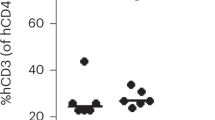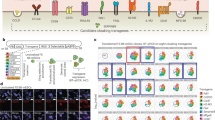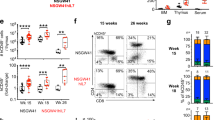Abstract
HETEROGRAFTS of human skin or tumour cell lines can be grown in the mouse using antilymphocyte serum (ALS) as immunosuppressant1,2. Human foetal tissue has been successfully grafted to rats treated with cortisone3. We have found that human foetal tissue will grow in mice thymectomized as adults and treated with ALS.
This is a preview of subscription content, access via your institution
Access options
Subscribe to this journal
Receive 51 print issues and online access
$199.00 per year
only $3.90 per issue
Buy this article
- Purchase on Springer Link
- Instant access to full article PDF
Prices may be subject to local taxes which are calculated during checkout
Similar content being viewed by others
References
Lance, E. M., and Medawar, P. B., Lancet, i, 1174 (1968).
Phillips, B., and Gazet, J-C., Nature, 220, 1140 (1968).
Toolan, H. W., Proc. Soc. Exp. Biol. and Med., 86, 607 (1954).
Sjodin, K., Dalmasso, A. P., Smith, J. M., and Martinez, C., Transplantation, 1, 521 (1963).
Author information
Authors and Affiliations
Rights and permissions
About this article
Cite this article
PHILLIPS, B., GAZET, JC. Growth of Human Foetal Tissue in Mice treated with Antilymphocyte Serum. Nature 222, 1292–1293 (1969). https://doi.org/10.1038/2221292a0
Received:
Issue Date:
DOI: https://doi.org/10.1038/2221292a0
This article is cited by
-
Growth of Haemopoietic Spleen Colonies after Grafting of Human Bone Marrow in Mice
Nature (1970)
-
Survival of human thyroid tissues in mice treated with antilymphocyte serum
Die Naturwissenschaften (1970)
Comments
By submitting a comment you agree to abide by our Terms and Community Guidelines. If you find something abusive or that does not comply with our terms or guidelines please flag it as inappropriate.



